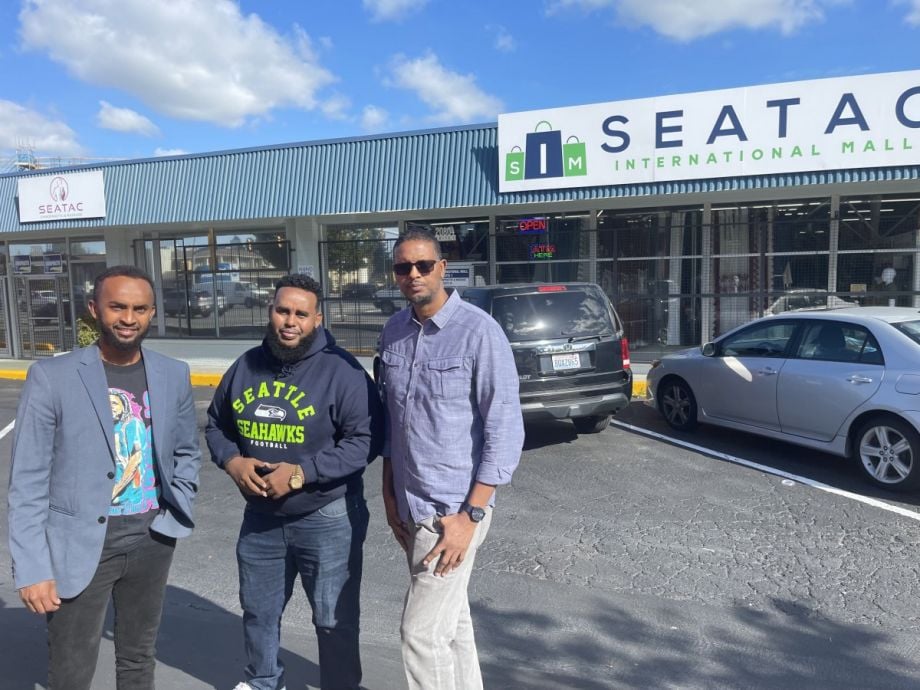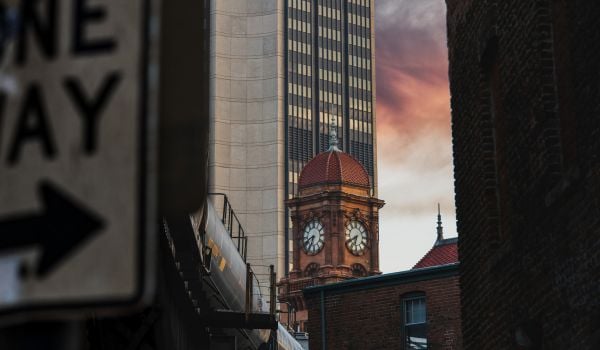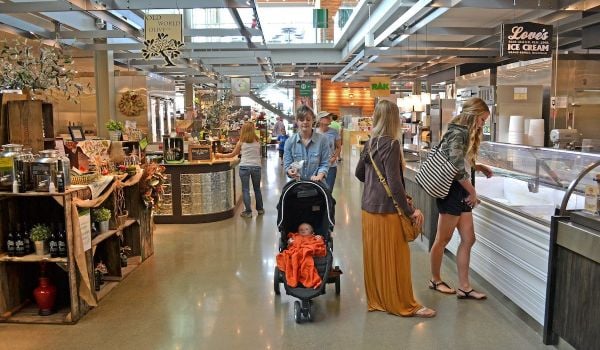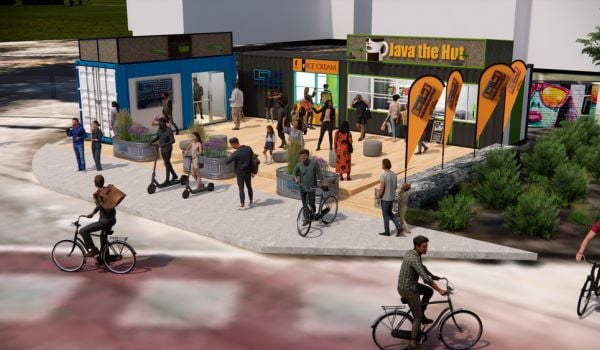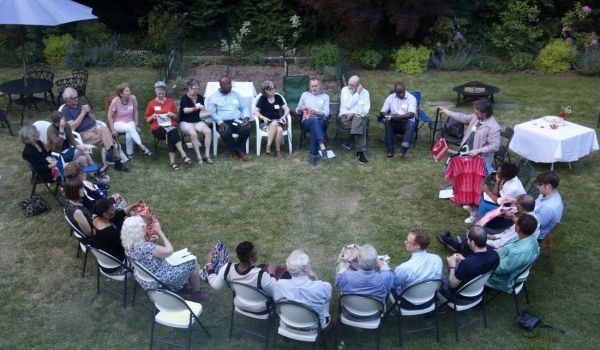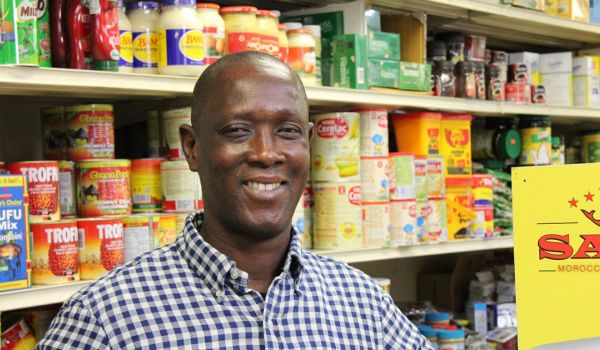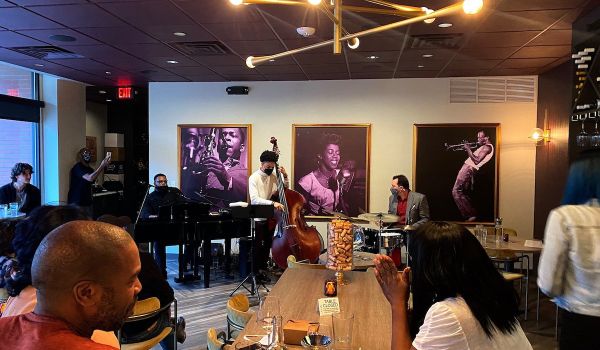Somali people have been entering the U.S. since the 1970s, but the exodus from the tiny East African country gained steam as millions fled the 1991 Civil War. Two cities attracted most of the Somali immigrants that came to this country: Minneapolis and Seattle. Many newcomers were lured to the latter by Boeing jobs, but over time the growing Somali community has built flourishing businesses in the region. Located 15 minutes from Seattle, the town of SeaTac, making up about 10 square miles halfway between the cities of Seattle and Tacoma, has created one of the most dynamic and racially diverse towns in the state.
Faisal Mohamed came to SeaTac in 2019 and today he’s living his American dream, contributing mightily to the Somali business community. The 32-year-old is co-owner of SeaTac International Mall, one of the most significant small-business projects in the town in recent years. Opened in May, the mall is at full capacity and houses most of the Somali vendors that were displaced when a nearby mall closed. The economic and commercial anchor has boosted the cultural spirit of the Somali community, even though it launched in the midst of a still-strong pandemic.
“It’s [significance is] huge,” Mohamed says. “The need was there to begin with. We had a waiting list before the grand opening.”
The $500,000 it cost to start the mall was financed by a patchwork of loans and grants. Craft3, a CDFI based in Seattle, provided a $200,000 loan. This investment is a salient example of a CDFI meeting minority entrepreneurs where they are. Citing the displacement of vendors caused by the closing of the prior mall, Che Wong, senior business lender at Craft3, explains her CDFI was attracted by SeaTac Mall’s significance to the community and to small businesses.
“It supports commercial space for the immigrant community,” Wong says. “That was appealing to us.”
Despite its promise, SeaTac International Mall indeed comes with risks. Among other challenges, this is Mohamed’s first entrepreneurial venture, and Covid’s Delta variant has shrouded many businesses in uncertainty. (This is not withstanding the fact that King County, where SeaTac is located, boasts a better-than-average 70% vaccination rate.) The pandemic has not been kind to minority-owned businesses overall. Immigrants suffered a 36% drop in active business from February to April 2020, according to the National Bureau of Economic Research.
Najmo Hamud, co-owner of Fashion King, is among the 90% of women vendors at the mall. Fashion King sells both traditional Somali clothes as well as western style T-shirts and shoes. “We’re busy,” she says. She’s very sanguine about prospects for her store, but acknowledges she’s not making as much money as she expected so far. Due to Covid “people just don’t have enough money to shop,” she says.
Mohamed won’t disclose revenue expectations, but says “things are going well so far.” Providing masks and sanitizers has increased operational costs but Mohamed says he doesn’t see any impact on revenue this year “if things stay the same.” The 9,000-square-foot mall houses 21 stalls, for which vendors pay $650 to $700 a month.
“With Delta there’s a bit of uncertainty with things,” he says. “It’s a learning experience managing a mall, but we’re starting to hit our stride.”
Mohamed and investors are betting the group’s three-headed management approach will provide the diverse business skills necessary to successfully manage the shopping center. Mohamed has a business management degree from North Dakota State University and experience in corporate procurement and supply chain. The other owner is his brother-in-law, Mahamud Duale, who was a former grocery store owner and tackles operations. Abdirashid Hersi, a family friend and long-time Seattle resident, brings a lengthy experience in community engagement.
They found a space for lease in 2019, but had problems finding financing until the Chamber of Commerce referred them to Craft3, which also provided technical assistance and consulting. The group also received a $150,000 grant from the King County Communities of Opportunity Commercial Affordability Pilot Program.
“SeaTac is a story of community empowerment,” says Dave Upthegrove, a councilman in King County. “It’s important economically because it’s giving an affordable place for people to run affordable businesses.”
SeaTac has 30,000 residents, representing more than 80 nationalities. Sixty-two percent of its residents are non-white. City agencies can’t estimate the number of Somali immigrants in SeaTac, but some estimate there could be up to 30,000 Somalis in Seattle overall.
Mohamed wants to make the mall a one-stop shop for the Somali community. It has a barber shop, deli, community center and even a chiropractor’s office. The owners are also in the preliminary stage of building another mall 15 to 20 minutes from SeaTac. “We’re almost at full capacity there, too,” he says.
If Mohamed approaches Craft3 for possible funding for this new project, he’s likely to find a willing ear. Wong is impressed with the progress so far at SeaTac International Mall. “They are full and have a waiting list and the community is welcoming of the project,” she says. “From my perspective, it’s a success.”

This story is part of our series, CDFI Futures, which explores the community development finance industry through the lenses of equity, public policy and inclusive community development. The series is generously supported by Partners for the Common Good. Sign up for PCG’s CapNexus newsletter at capnexus.org.
Christopher C. Williams is a New Jersey-based freelance financial writer. He worked for many years with Dow Jones Newswires and Barron’s Financial Weekly and has contributed to publications including the Wall Street Journal, The New York Times and Essence magazine. He focuses on the intersection of business, economic equity and racial justice.

